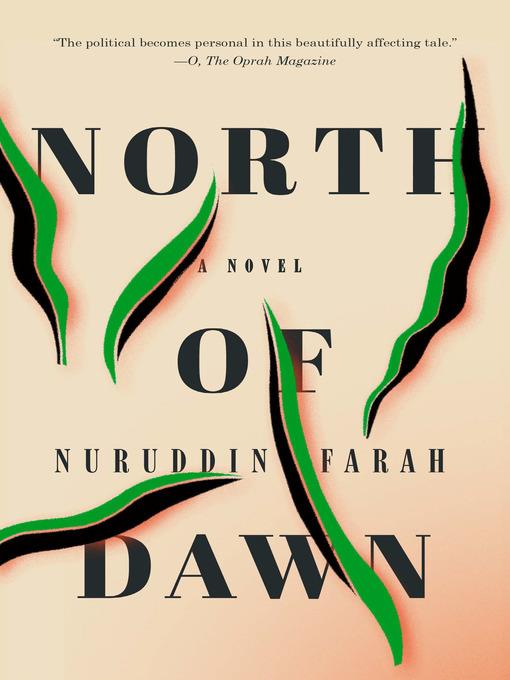
North of Dawn
A Novel
کتاب های مرتبط
- اطلاعات
- نقد و بررسی
- دیدگاه کاربران
نقد و بررسی

October 15, 2018
Farah (Links) sacrifices depth for a rapid, lackluster jaunt through the complications of Somali immigrants in contemporary Norway. Gacalo and Mugdi’s quiet life in Oslo is upended when their son perpetrates a suicide bombing in Somalia. Gacalo stretches legality to bring her son’s widow, Waliya, and stepchildren Naciim and Saafi to Norway as refugees. Waliya rejects encouragement from Gacalo, Gacalo’s daughter Timiro, and fellow immigrants to integrate into society, retreating into a devoted practice of Islam. Naciim excels at school and clashes with his mother over her growing attachment to an extremist imam suspected of terrorism. When the imam beats Naciim and is rapidly convicted of abuse, a tragedy befalls the family. Subsequent events lead Mugdi to an aimless detachment while Naciim’s increasing assimilation pulls him further from Waliya’s narrow worldview. The rush of events makes the novel disappointedly abrupt, and the difficulties of side characters (including the shallow treatment of Saafi’s trauma from being raped in a refugee camp) muddy an already convoluted plot. While Farah captures the struggles of Somalis navigating the space between European nationalists and Islamic fundamentalists, diffuse storytelling blunts the work’s impact.

November 1, 2018
A Somali husband and wife living in Norway are pitched into chaos, acrimony, and upheaval after their son embraces radical Islam and dies as a suicide bomber.As in Farah's last novel, Hiding in Plain Sight (2014), an act of violence sets in motion a chain of events disrupting a family's stable life. It is the spring of 2009, and Mugdi, a former Somali diplomat now living in Oslo with his wife, Gacalo, has found out that their estranged son, Dhaqaneh, who fled to their homeland as a jihadi, has blown himself up at the international airport there. Gacalo, upon recovering from her grief, reminds her husband of the promise he made: that they would welcome into their home their widowed daughter-in-law, Waliya, and her two young children from a previous marriage. Mugdi, more than his wife, is bracing for what could be an unsettling culture clash, and his apprehensions grow when he finds Waliya to be sullen, withdrawn, and monastic in adhering to her Islamic faith, demanding that her son, Naciim, and daughter, Saafi, rigidly follow her religious tenets. But both children are attracted by the freedoms their new homeland offers, especially Naciim, who almost from his arrival in Norway yearns to earn enough money to buy a lottery ticket. He also chafes at the many strict rules imposed by his mother, including her fierce opposition to his associating with non-Muslim school friends and their families. The anti-immigrant bigotry of Norwegian citizens looms over this family's painful transition, exploding at one point with Anders Behring Breivik's 2011 mass slaughter of more than 70 people, including teens attending a multicultural youth camp. At the opposite end of the spectrum is the anti-Western intolerance of Waliya and some of her fellow refugees, which reaches a tipping point with Naciim after he is brutally whipped by an imam as "punishment" for "disrespect." Between these two violent extremes, Mugdi's besieged-but-steadfast equanimity, as well as the author's, provides relatively safe haven from the prevailing tension and strife.As one of the characters puts it, "Art is a humanizer," and Farah's insistence on isolating the humanity in even the most difficult characters is a beacon of hope against fear and loathing.
COPYRIGHT(2018) Kirkus Reviews, ALL RIGHTS RESERVED.

November 1, 2018
For years, Mugdi, a Somali native, served in the diplomatic corps in Norway, and he and his wife, Gacalo, enjoy a life of relative affluence in Oslo. However, the family nurses a private agony after their son, Dhaqaneh, dies in terrorist-related activities in Somalia. Tortured by guilt over his premature death, Gacalo insists on taking care of his widow, Waliya, and her children. But Waliya's brand of conservative Islam clashes with Mugdi and Gacalo's version and threatens to tear the fragile family further apart. Farah's (Hiding in Plain Sight, 2014) exploration of the challenges of assimilation is a worthy goal, but a fair number of plot elements remain underexplored in a story that unfolds more like a dramatic play than a novel, complete with sudden exits by key characters. Repeated allusions to the 1920s Norwegian classic Giants in the Earth, which tracks early Norwegian assimilation in North America, feel forced. Nevertheless, Farah offers a soulful look at the divide between zealous ideology and secularism. As one character says, When elephants get into a wrestling match, it is the grass that suffers. (Reprinted with permission of Booklist, copyright 2018, American Library Association.)

July 1, 2018
Gacalo and Mugdi have raised their children comfortably in Oslo, but son Dhaqaneh, rubbed raw by his perpetual outsider status, becomes a jihadist in Somalia and bitterly blows himself up in a suicide attack. His parents take on daughter-in-law Waliya and their two teenage grandchildren, freeing them from a refugee camp but opening further complications. Waliya and her daughter sink more deeply into religion, while Waliya's son relishes the opportunities of his new homeland. From award-winning Somali writer Farah, a giant of African literature, always incisive in tackling the issues presented here.
Copyright 2018 Library Journal, LLC Used with permission.

























دیدگاه کاربران